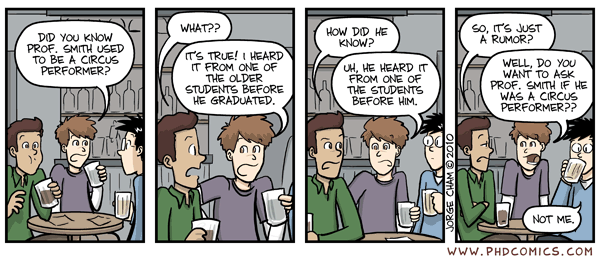 |
| The Inside of my Brain on Graduate School December |
December is looming.
Only for graduate students is December such an ominous month. Or, at least that’s how I feel as a graduate student. While everyone else gets to go gift shopping for the holidays, I have to lock myself inside and write all those final papers. I find can’t listen to Christmas music until my papers are done or I’ll become bitter and make everyone around me miserable, including myself. This year, I’ve decided to try something new: I bought a candle at Bath & Body Works that smells like Balsam. The “Christmas Tree smell” is, so far, making me happy and not sad. We’ll see how long it lasts.
Only for graduate students is December such an ominous month. Or, at least that’s how I feel as a graduate student. While everyone else gets to go gift shopping for the holidays, I have to lock myself inside and write all those final papers. I find can’t listen to Christmas music until my papers are done or I’ll become bitter and make everyone around me miserable, including myself. This year, I’ve decided to try something new: I bought a candle at Bath & Body Works that smells like Balsam. The “Christmas Tree smell” is, so far, making me happy and not sad. We’ll see how long it lasts.
The other problem with this time of year for grad. students, whether you celebrate Chrismahanukwanzika or not, is that whole overwhelming amount of work thing. (Remember when I said that I have to lock myself inside to write papers? Not joking. Literally survive on mac and cheese and Facebook stalking for about two weeks.) This semester, December is intruding on November too. The nutter-factor is getting worse already, and Thanksgiving just passed! So, for your entertainment, I will explain to you the symptoms of my particular brand of information overload.
Before we get into it though, I have a small prelude: As a recent Chronicle article I read explains very thoroughly, information overload is not simply a symptom of our own time. You cannot convince me that if I would just get off the computer I would not have a problem (as if that were possible anyway). By my examples further on, you’ll see why. But I really do agree with the author of this article when she says that “It's important to remember that information overload is not unique to our time, lest we fall into doomsaying.” You can get overloaded with stimuli in general…even if it’s just words on paper (as in my first example, below).
So, without further ado, I give you…
THREE FATAL SYMPTOMS OF IMPENDING DECEMBER MADNESS:
1. I have starting creating mash-ups of books I’m reading from different classes. The doctors from Middlemarch and The Hidden Hand are getting confused in my brain. Who was it who saved an old man in France from dying of a fever again? Did both of them do it? *gulp*
2. It’s not just books I’m mashing up anymore. I’ve starting mashing up people. My roommates and I have started doing Battlestar Galactica nights on Wednesday, where we watch the show (don’t tell me what happens!!! I’m only on season 4.0!) and eat foods that begin with the letter B. It’s been really great…a good way for me to set aside both time to wind-down from my anxiety-ridden schedule and to bond with my roommates. But things have started creeping into my dreams. Most nerds dream about school at least sometimes, right? Well…I recently had a dream that one of my professors was best friends with Laura Roslin from BSG. I was super jealous. Then I woke up. And I was super embarrassed.
3. I’m crashing earlier. Generally I can stay up until 4am, sometimes even 5am, and remain completely lucid. I’m a night owl. But either I’m getting old (which is a strange thing for a 23-year-old to suggest) or the end-of-semester-burn-out has come sooner than expected, because I’m starting to crash earlier and earlier. The early nightfall doesn’t help either. And neither do my mild panic-attacks when I think of all the work I have left to do (ok…those kind of help in the sense that they wake me up. But they can’t be healthy. Even if they’re not really panic-attacks).
December is looming. And so is insanity.
WARNING: If you are experiencing any of the above symptoms, seek psychological support from your peers immediately. Commiserating is the best medicine in these times of terror.




